2023 Rivian R1S hits Rocky Mountain highs
In the Rocky Mountain town of Salida, Colorado, adventure calls. Rafting in the summer, skiing in the winter, cycling and brewing year round, it’s a gateway to high mountain fun at 7,000 feet above sea level.
It’s also a place where Rivians outnumber Teslas, at least two to one. So it seemed upon my arrival with the 2023 Rivian R1S, the three-row SUV counterpart to the R1T adventure pickup truck. I came to play with my brother-in-law and sister, who in the last year had relocated to Salida, and who in the last month had replaced their Dual Motor Tesla Model 3 with the R1T.
Rivian’s outsized presence in one small corner of the world proves that it’s appealing to its target demo, the outdoor enthusiast. With an air suspension providing 15 inches of ground clearance, and a Quad-Motor system enabling 10 drive modes, including five off-road selections, the Rivian siblings epitomize the ideal combination of no-compromise adventuring and eco-friendly exploring.
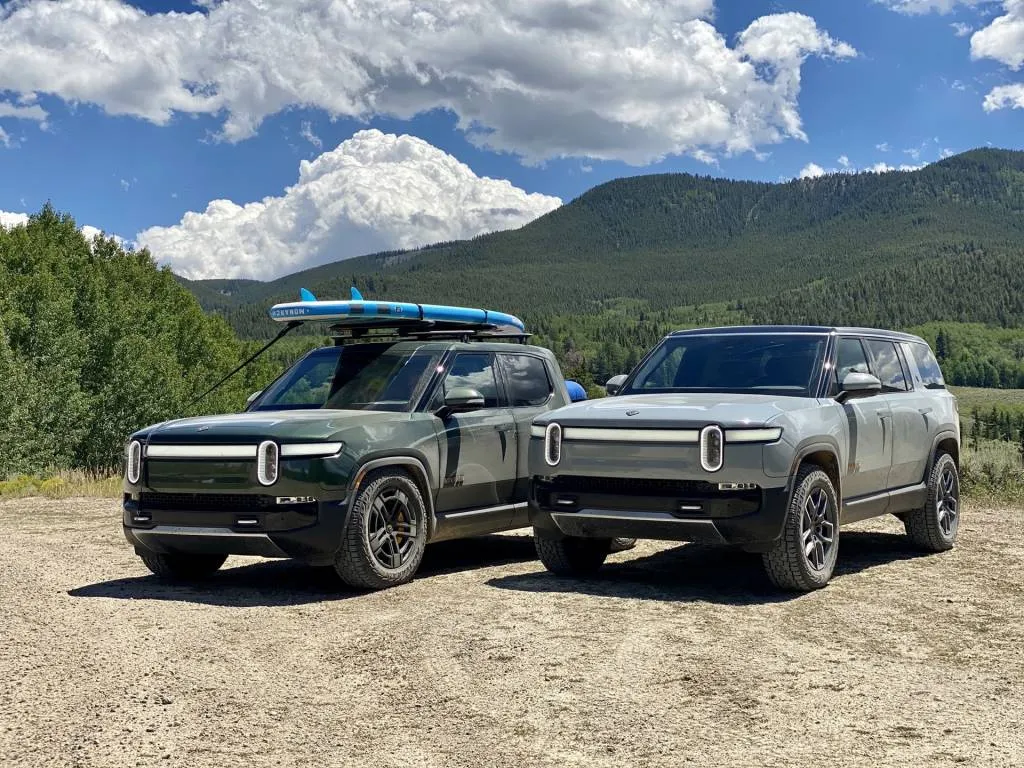
Rivian R1T, green, vs. Rivian R1S, silver
Salida’s home to fewer than 6,000 people, but host to hundreds of thousands of tourists. It also hosts a Rivian Adventure Network, with four DC fast-chargers rated at 215 kw, and three 11-kw Level 2 chargers, all powered by 100% renewable energy, according to Rivian.
My family’s R1T would carry the paddle board, their bed would hold the inner tubes, and their gear tunnel would hold most of our overnight gear on our camping trip. No way we could have done that in their Model 3.
But first, I had to traverse the Rockies at dusk during a torrential downpour that smothered the peaks and washed out the single-lane road.
This was not the adventure I envisioned.
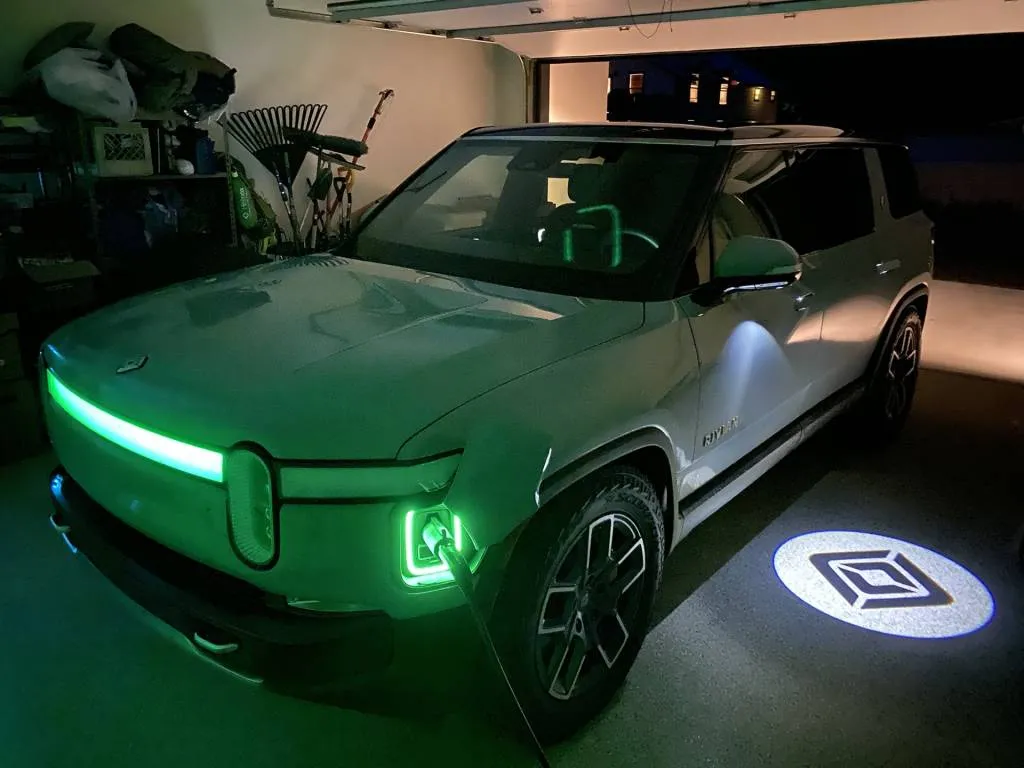
Rivian R1S leans into normal road conditions
I set out from the ranching town of Berthoud, Colorado in a Rivian R1S Quad-Motor with the Adventure Package that includes 20-inch wheels wrapped in 34-inch Pirelli Scorpion all-terrain tires. With this configuration and the 135-kw Large pack, the EPA estimates a range of 274 miles with a fully charged battery pack. I had 84% capacity left and 188 miles to my destination, according to my trip computer.
Since Rivian doesn’t offer Apple CarPlay or Android Auto compatibility, I obsessively checked the distance in my phone’s Google Maps against Rivian’s estimate at traffic stops through Boulder. My last EV road trip in the Mercedes-Benz EQS SUV 580—one of the few other three-row electric SUVs on sale now—taught me to minimize risks and avoid variables beyond my control. By both estimates, I would have about 40 miles to spare. But I’d be climbing about 1,700 feet total before dropping back into the Salida valley. And there are always variables.
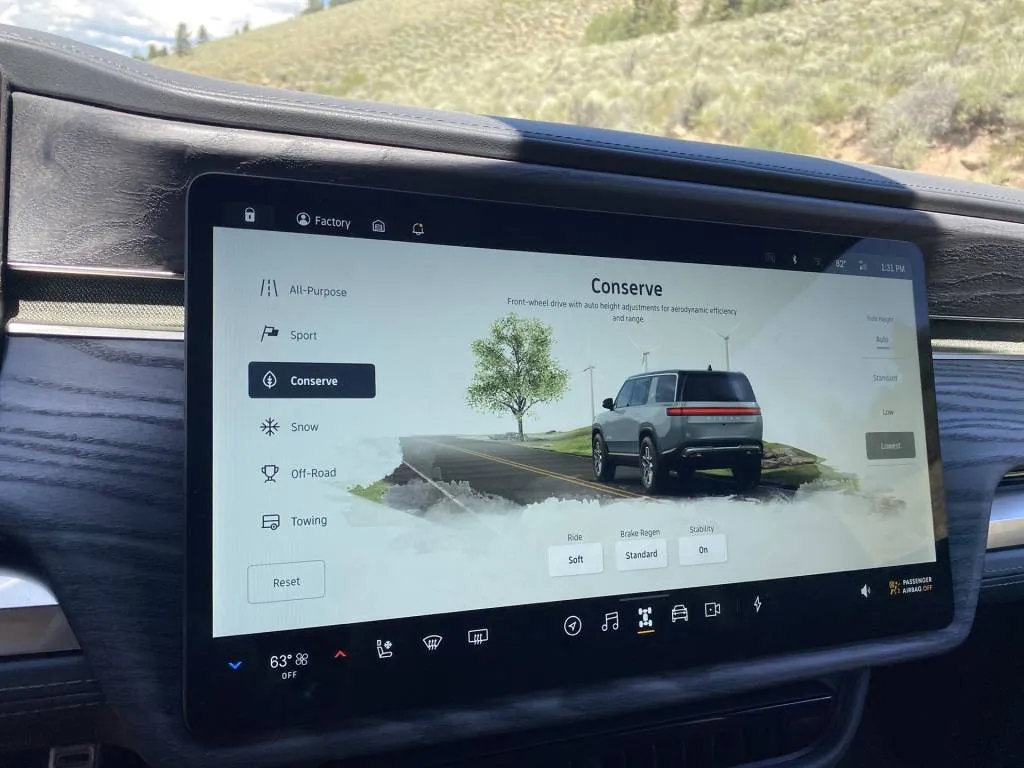
2023 Rivian R1S
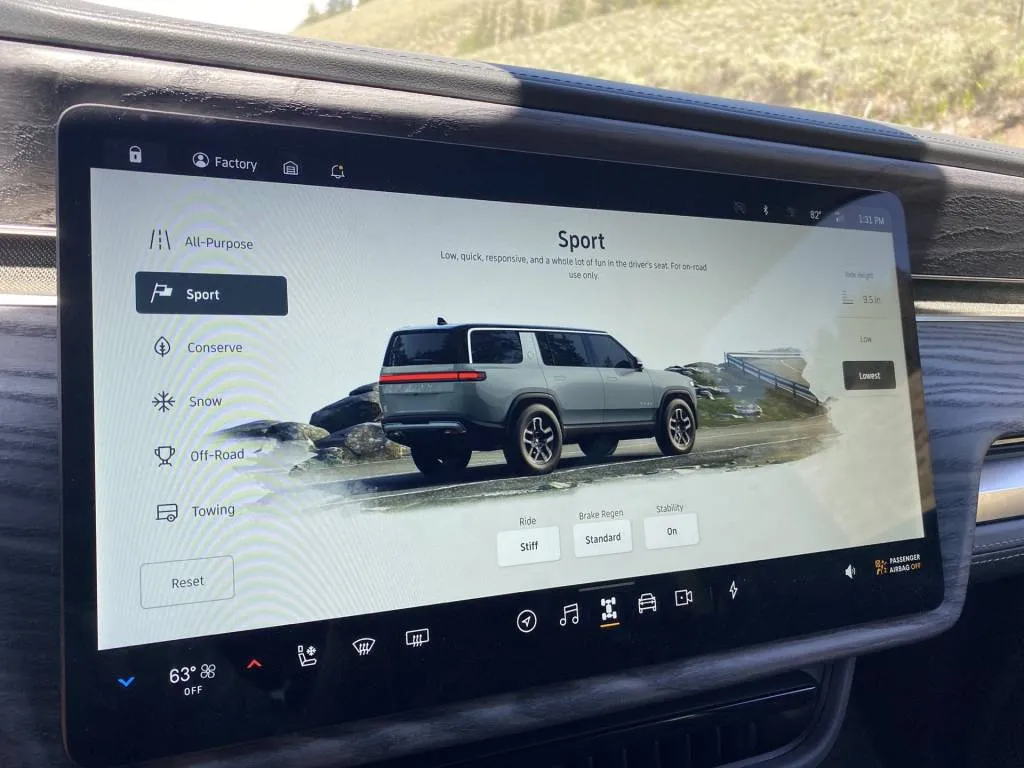
2023 Rivian R1S
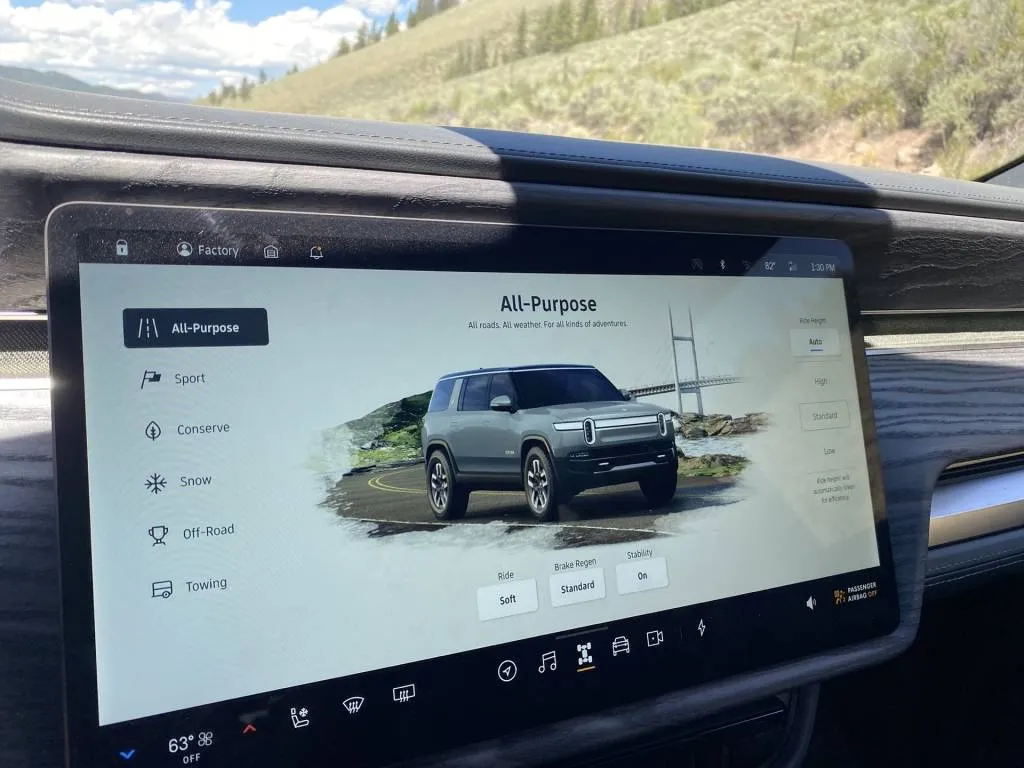
2023 Rivian R1S
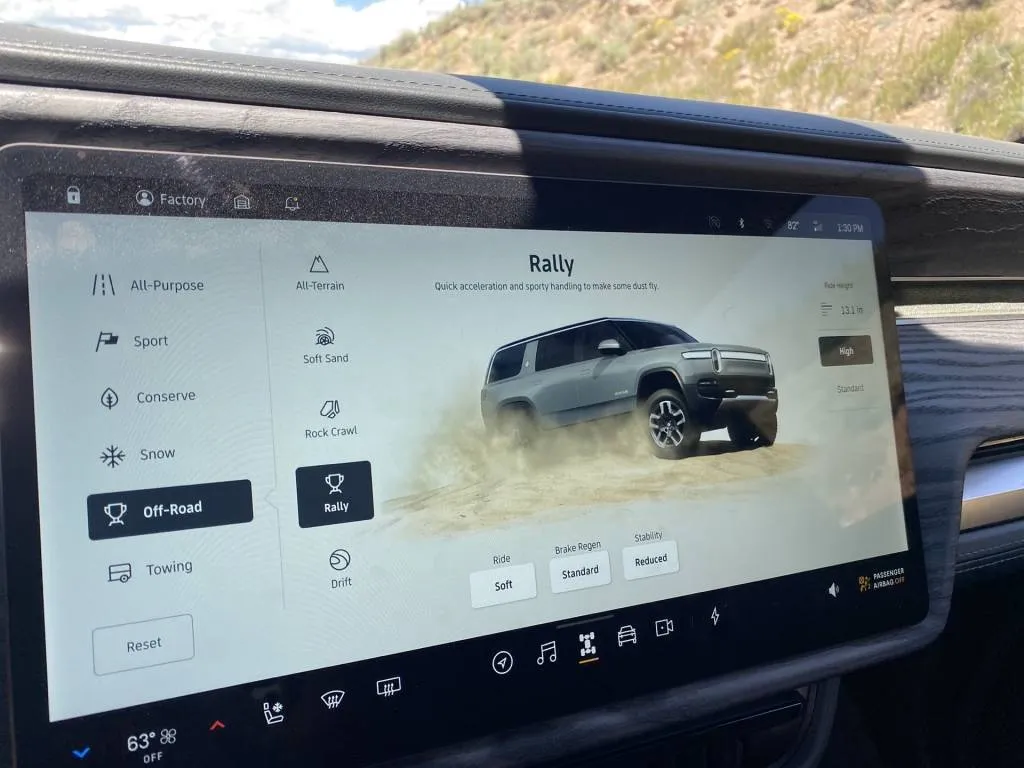
2023 Rivian R1S
To start, I kept it in Sport mode, one of the five core drive modes along with Conserve, Snow, All-Purpose, and Off-Road, which has another five drive modes ranging from Rally to Rock Crawl to Towing.
Those five core modes adjust the air suspension accordingly, with five more settings that the driver can override, from 15.0 inches of ground clearance down to 9.5 inches at its most efficient.
The driver can manually adjust three other drive settings, as well: ride quality can be Firm or Soft; regen can be High or Standard; stability control can be set to On, Reduced, or Off. This is done through a 15.6-inch touchscreen that blends horizontally into the 11.8-inch digital instrument cluster in a rectangular dash trimmed in wood. A small band of icons below the speedo in the cluster shows all these settings in a quick glance, so the larger touchscreen can be used for navigation or surround-view camera angles or most other vehicle functions.
There’s a lot to play with but within an hour of driving it, I had the ideal setup for front-range cruising: Sport mode with the ride Soft and regen High. With that big battery feeding two motors on both axles, the R1S makes 835 hp and 908 pound-feet of torque. It shoots to 60 mph in about three seconds, but it didn’t pin me to my seat and make me question my lunch. And all that torque moving about 7,000 pounds caused the all-terrains to scrabble at launch.
At speed, the power remained plentiful but it was never darting forward too abruptly and the High regen setting never grabbed too hard. It was smooth, for the most part. Being inconsistent on the accelerator caused little shudders, as if it were asking me what’s up, guy?
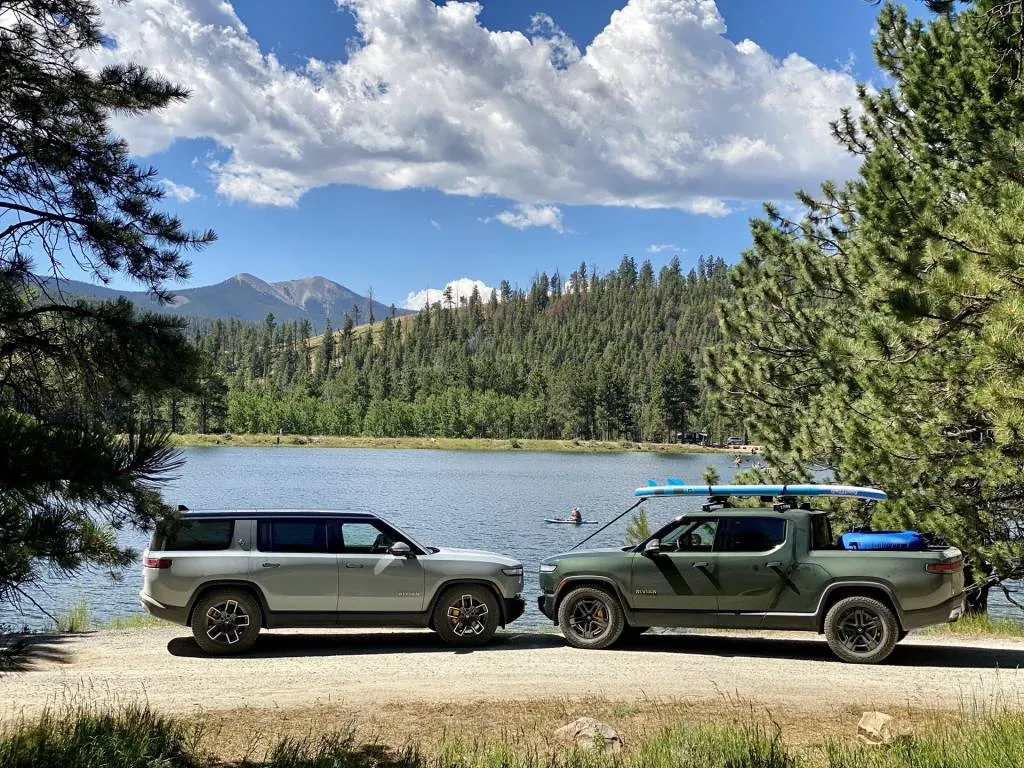
Rivian R1T, green, vs. Rivian R1S, silver
Rivian R1S vs. R1T differences
Rivian says the R1T and R1S are the same from the B-pillar forward and even though they share the same mechanicals, there’s a difference in ride quality.
The R1S measures 16.3 inches shorter in length and has a wheelbase that’s 14.6 inches shorter. The double wishbone front and multi-link rear suspensions are the same, as is the hydraulic anti-roll system that effectively acts like a variable anti-roll bar for the front and rear axles. This allows for some big articulation off-road and limits the amount of body lean on-road. In back-to-back testing with the R1T, the R1S SUV had slightly more hop to it on pavement and the lean in turns felt more pronounced.
On winding roads I was less inclined to push it harder. Sport mode in Firm quelled some bounce and lean, and relative to other three-row SUVs, it handled more like a sport wagon.
Until the storm.
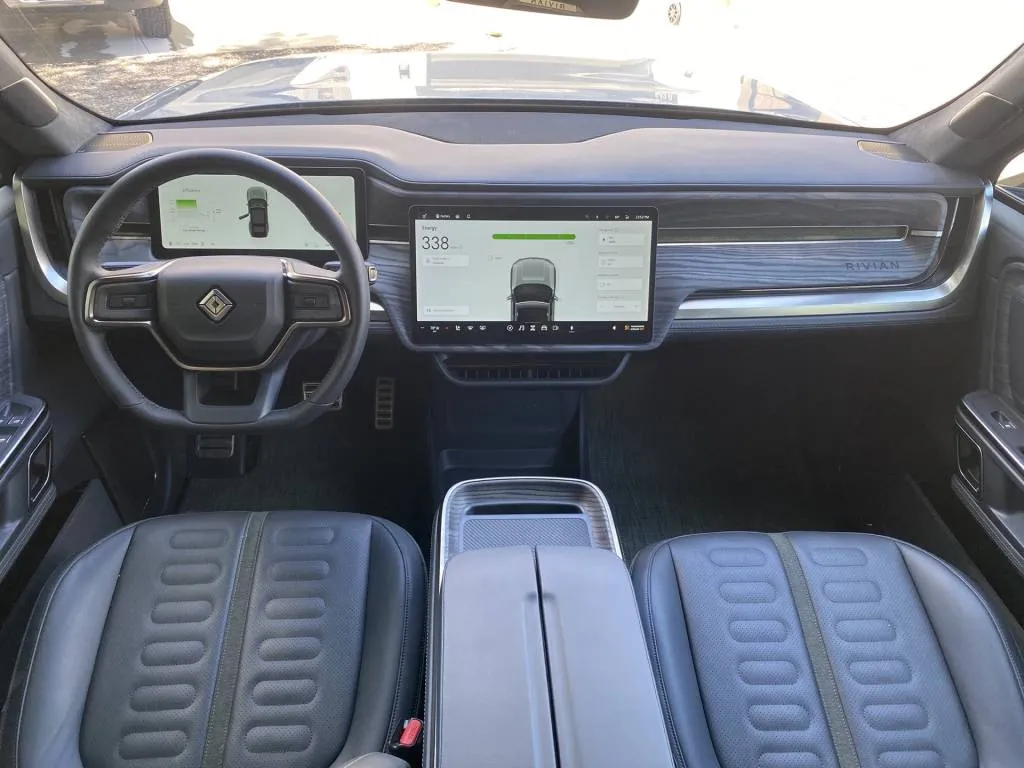
Rivian R1S navigates the storm
Tridents of lightning revealed thunderheads smothering the tree line. At only 6:30 p.m., it was dark enough and raining hard enough to blur the lane markings and scatter the occasional headlights or taillights.
I set it to All Purpose mode then stopped fiddling to concentrate. It felt so solid and planted, all four wheels staying squarely on track, that I pressed on, skipping the turnouts where other cars had stopped, convinced that the conditions would only worsen as night came.
The boost in confidence came from the technology as much as the drive system. Even though my phone had no service, the graphics on the map display remained strong as ever and the range and battery estimate changed with the modes and the terrain.
Throughout my five-day trip, I grew more impressed with the accuracy and reliability of Rivian’s in-house software and interface. I’ve tested enough EVs to rely on battery percent charge only, but having a corresponding and accurate mile range eased all kinds of anxiety. This made a huge difference in comfort when toggling between modes and suspensions, driving through a downpour, and considering the steep elevation changes and 50-degree temperature fluctuations.
I arrived with 25% battery charge left, or 80 miles in Conserve mode. The only anxiety I experienced was from the weather.
Charging the Rivian R1S
I charged it overnight in the comforts of my sister’s garage. They had repurposed their Tesla 240-volt, 48-amp wall unit with a J1772 adapter. With that setup, the R1S charged at a max rate of 11.5 kw, which is the highest output of three possible amperages, for about 25 miles per hour. (The lowest is 32 amps at a rate of 7.7 kw, or about 16 miles per hour.)
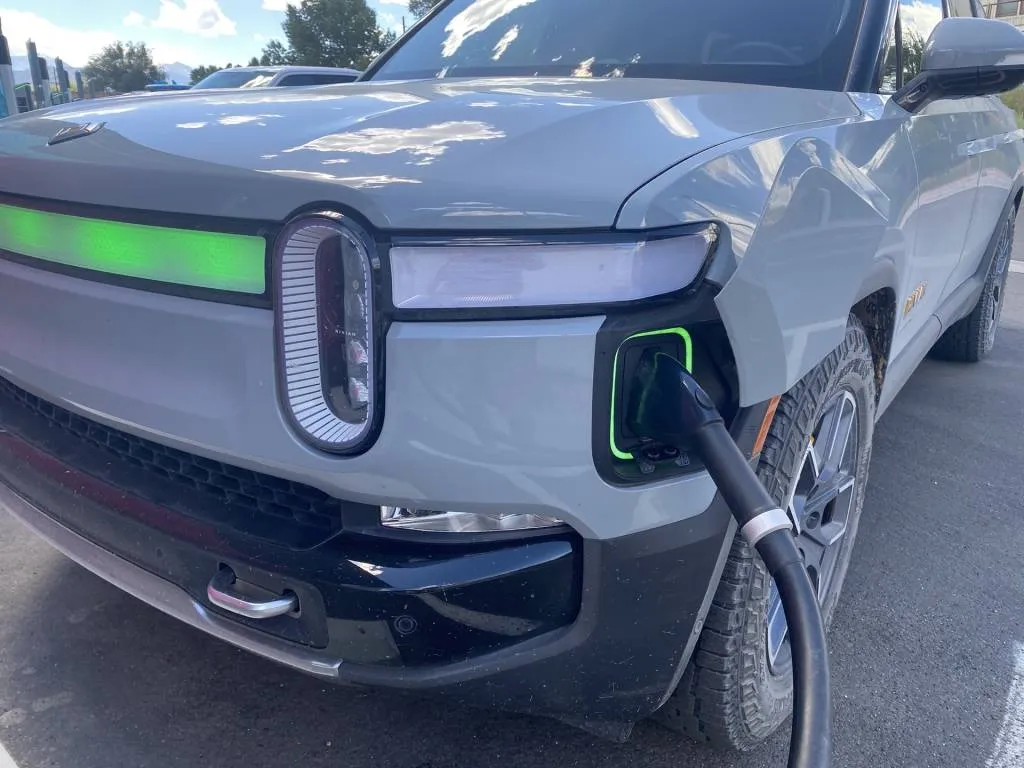
2023 Rivian R1S
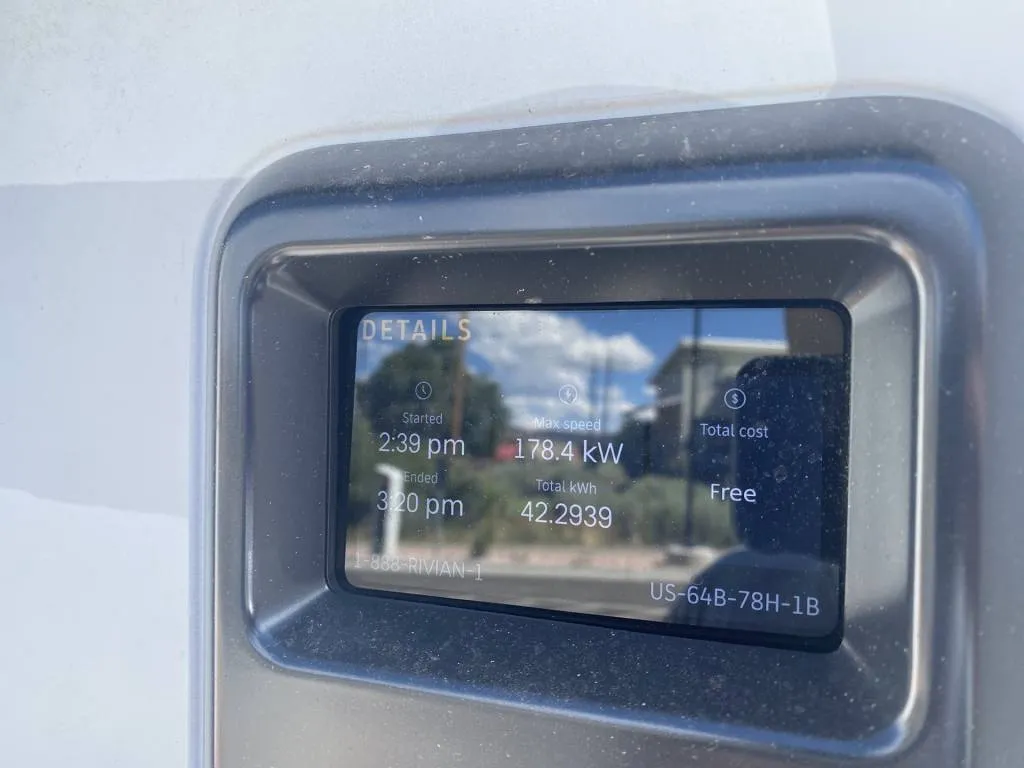
2023 Rivian R1S
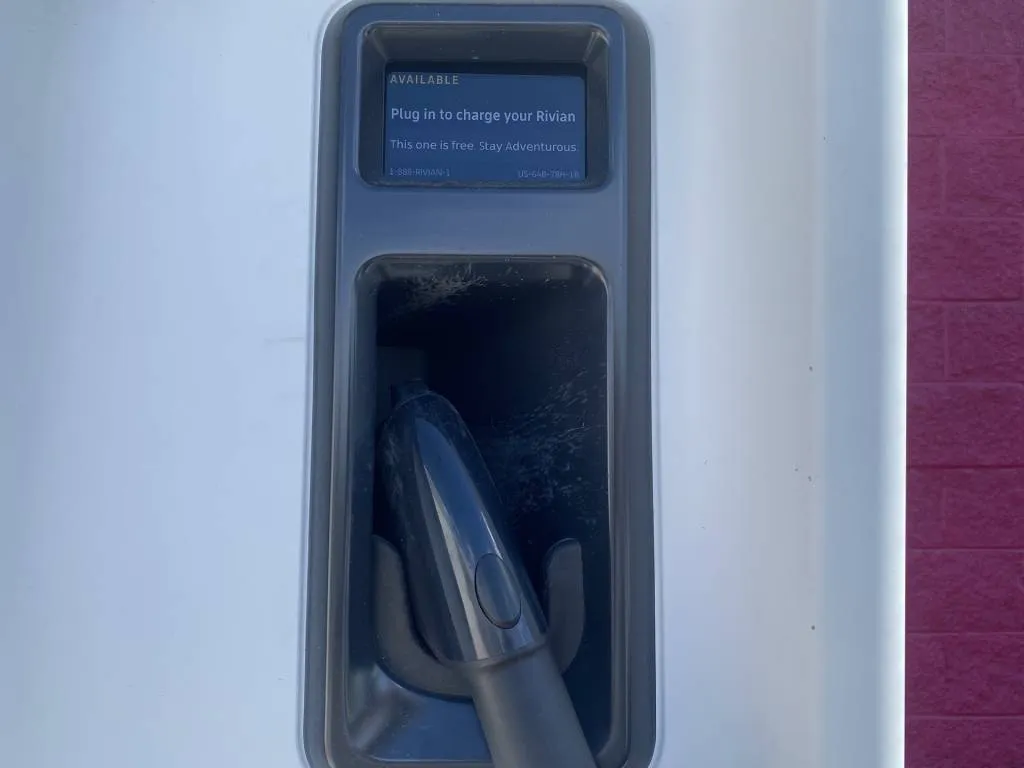
2023 Rivian R1S
A few days later, before leaving, I charged it for free in downtown Salida. The seven Adventure Network ports sit in the shade of a Safeway supermarket, right off an old railroad line turned bike path. We followed the hoots and hollers coming from the Arkansas River raging through downtown, then strolled around for a bite, so I wasn’t able to confirm if it delivered 140 miles of range in 20 minutes, as Rivian claimed. It charged plenty fast, however, at a max power of 178.4 kw despite the 95-degree heat. It went from 65% to 95% in 45 minutes, providing 42.3 kw of total juice.
Fully rested and nearly fully charged, we set out for our camping adventure.
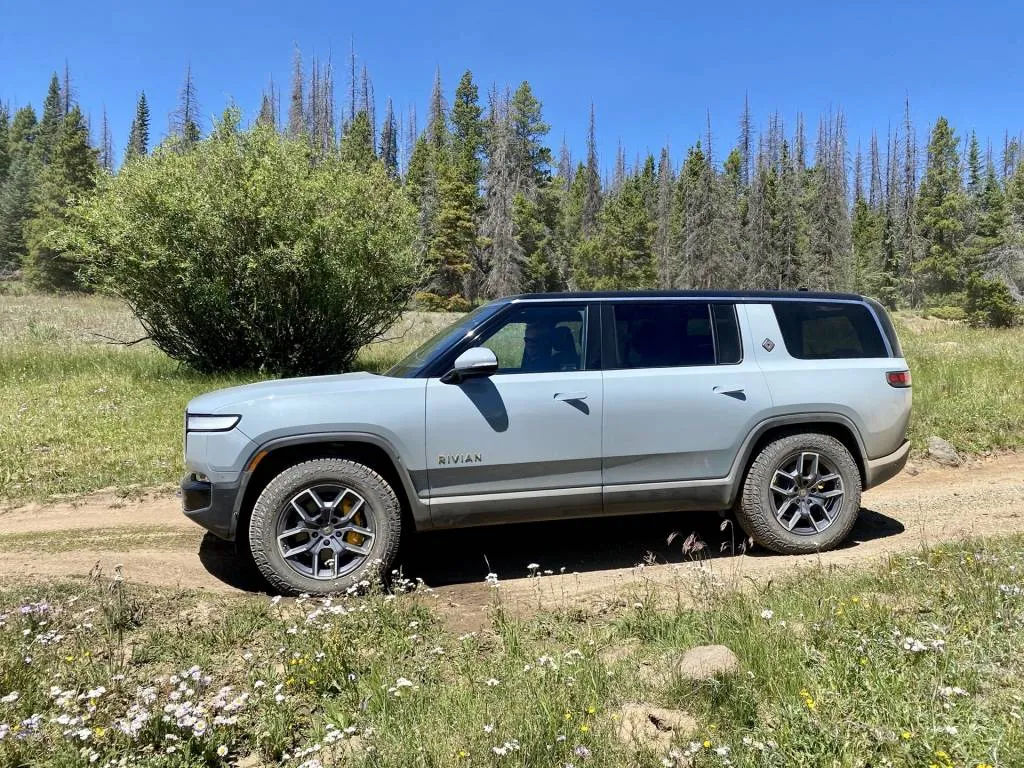
Off-roading in the Rivian R1S
It only took about 20 minutes to climb out of Salida and switch from Sport to Off-Road mode on a dusty jeep road. I switched to Rally mode that reduces stability control, the better to spit rooster tails at the R1T sag wagon behind me.
We explored a narrower, rockier, deeply rutted path untraveled by cars. We aired down the tires and clambered into a gulch, straddling boulders with our 15.0 inches of ground clearance in Crawl mode and articulating off-set staircases thanks to the air suspension. It was nothing too extreme with the R1T still laden with toys. The only traffic we encountered were single-driver off-roaders needing to perch on the ledge to let us pass.
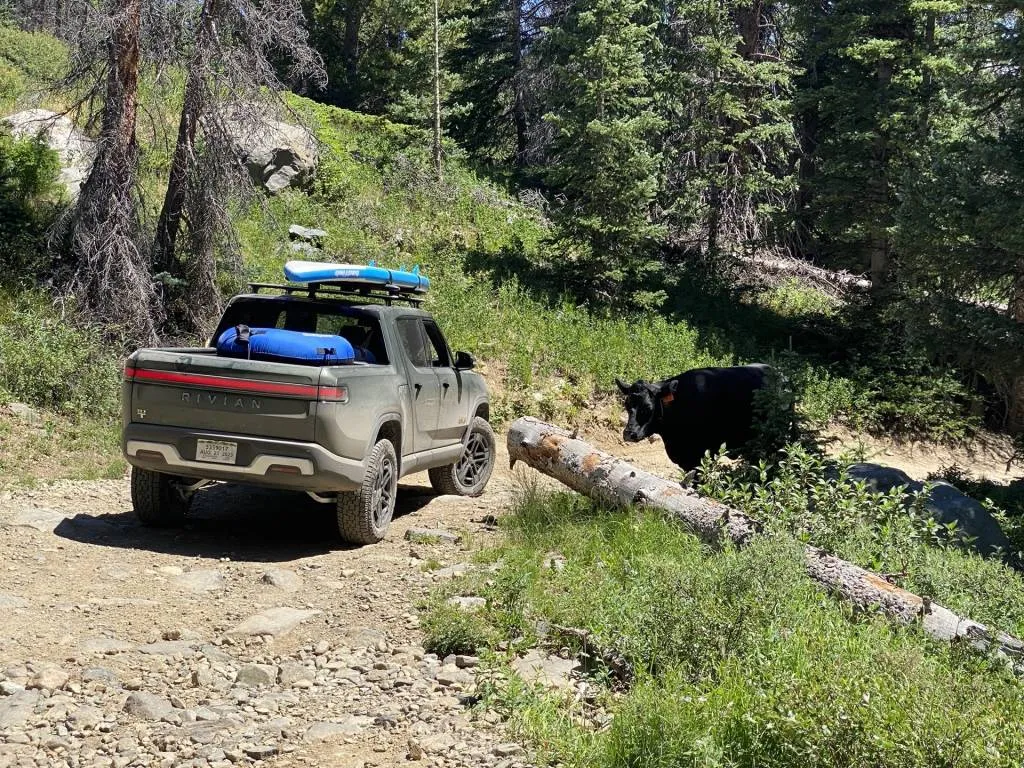
2023 Rivian R1T
That is, until we encountered one trail user that wouldn’t let us pass: a big bull, leading a cattle herd along a trickling creek. There was a showdown. We waited soundlessly. They populated the trail, swatting flies, chomping cud. It stared, its mates stared, as if drawn by the Rivian’s robot eyes. We made a 15-point turnaround and headed out.
It was easier in the R1S because the turning radius is nearly four feet smaller. Due to the shorter wheelbase and shorter rear end, the R1S makes for a better off-roader on paper with a departure angle of 34.3 degrees (30.0 in the R1T) and a better breakover angle of 29.6 degrees (26.4 in the R1T). They can both ford more than three feet of water but we didn’t test it. Only thing they can’t do, it seems, is overtake a herd of cattle.
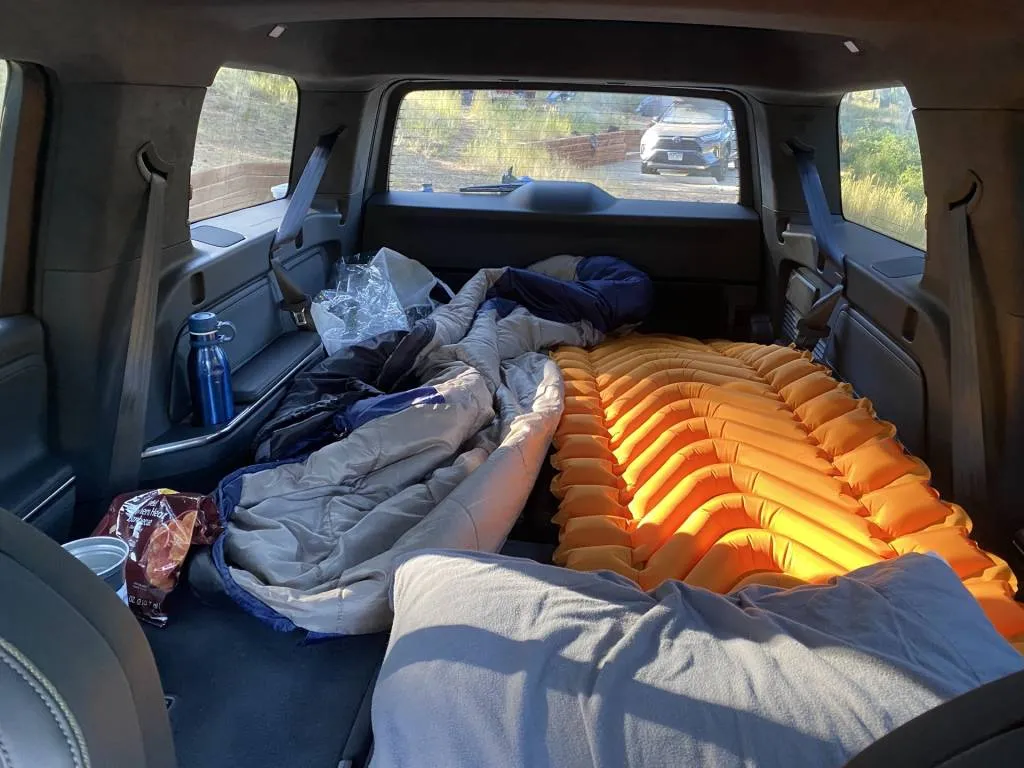
2023 Rivian R1S
Camping in the Rivian R1S
Once we decamped, unpacked the toys, turned up the camp speaker that stows so neatly under the center console, and started lightening the load in our coolers, I set the R1S to Camp mode. Already in Kneel mode, it automatically adjusts the suspension to make for as even a floor as possible. I chose the “Stay on” setting to have the climate control adjust from the 90-degree day to the 50-degree night. It also kept the center display on as a kind of nightlight.
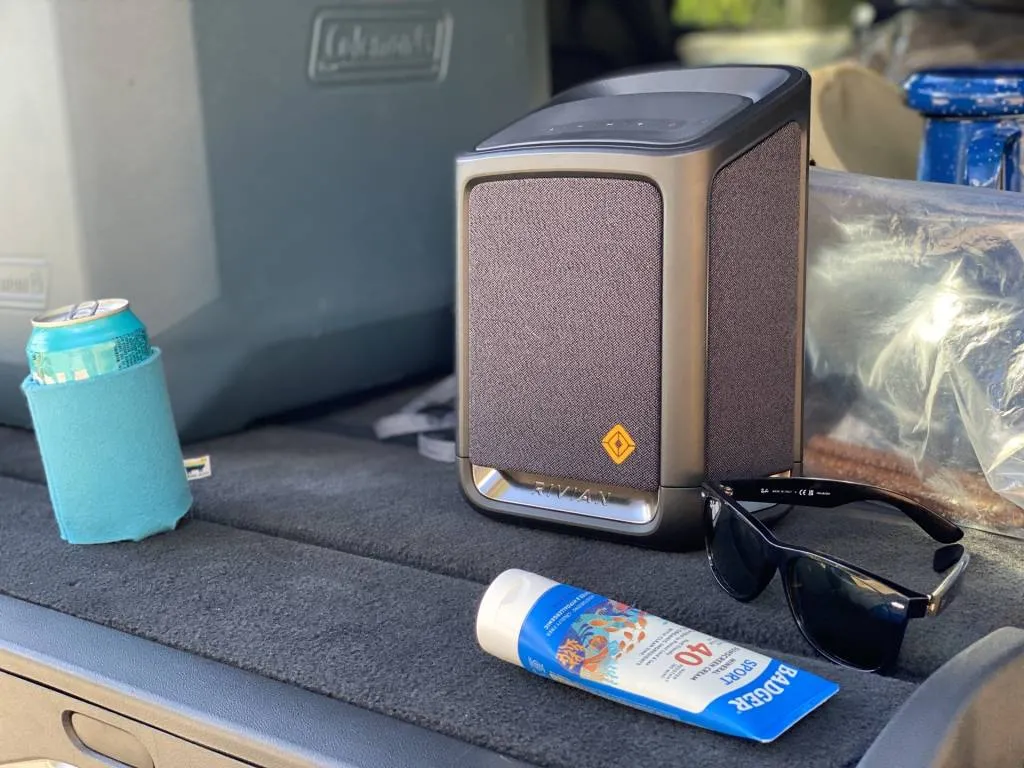
2023 Rivian R1S
A “Camp Courtesy” function turned off all the exterior lights and noises, so I could relieve myself in the middle of the night and not bother anyone. It ran the climate control at a quieter level as well, and the flood lights in the side mirrors lit up the area surrounding the truck. It was much better and less obtrusive than headlights. The flood lights could be adjusted individually, too, but had I needed it, I would have opted for the LED flashlight hidden in the door like a Rolls-Royce umbrella.
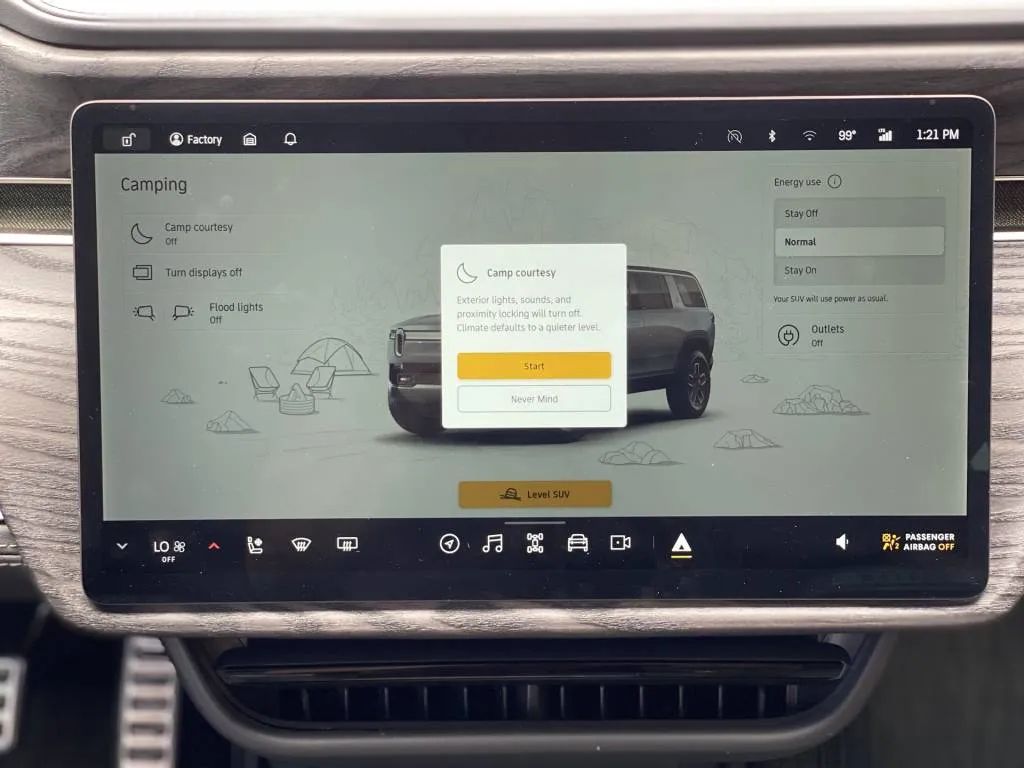
2023 Rivian R1S
With the second row power folded down from the cargo area, and the third row folded down with pull straps, I climbed up on my pad and camped inside the R1S. A full air mattress would have been better to absorb the gaps in the two rows, but it was roomy enough to fit two, and it was drier, quieter, and climate controlled, unlike my sister and her hubs in their tent. Not camping, not glamping, Riviamping. With the glass roof overhead, I still slept under the stars.
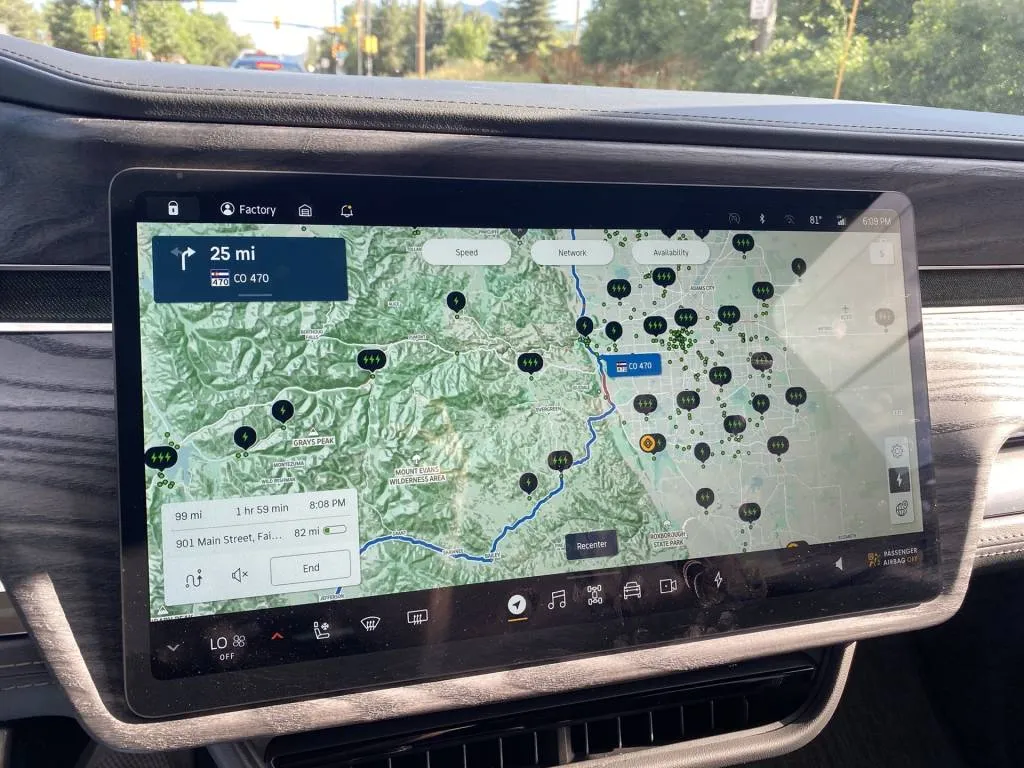
2023 Rivian R1S
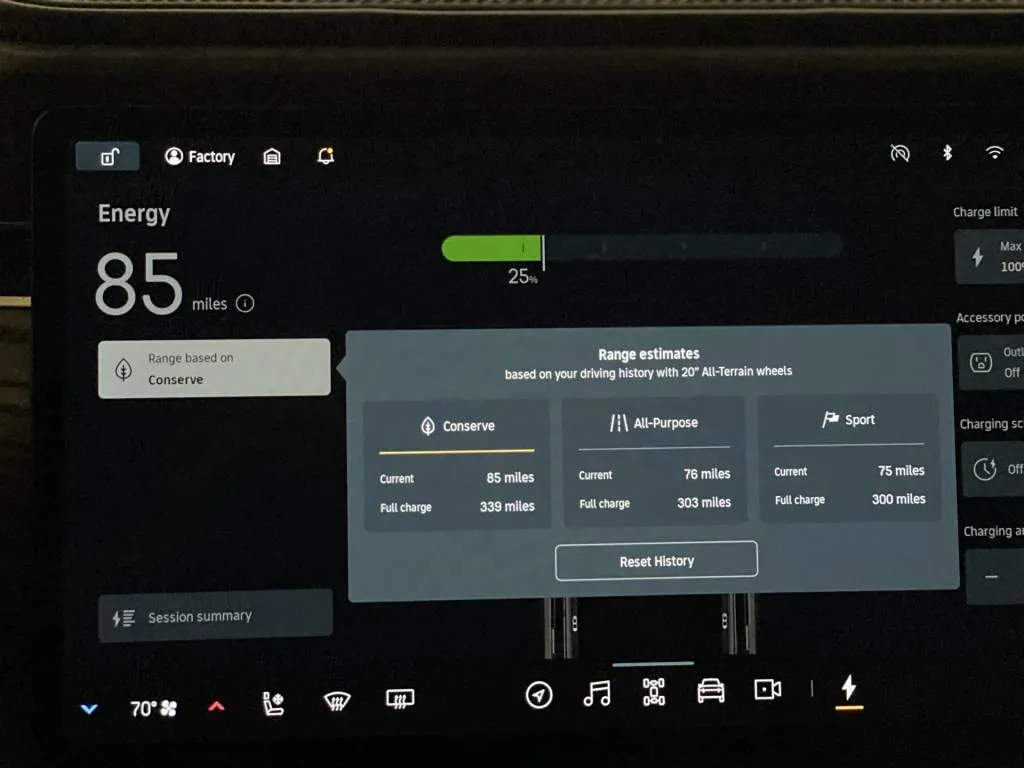
2023 Rivian R1S
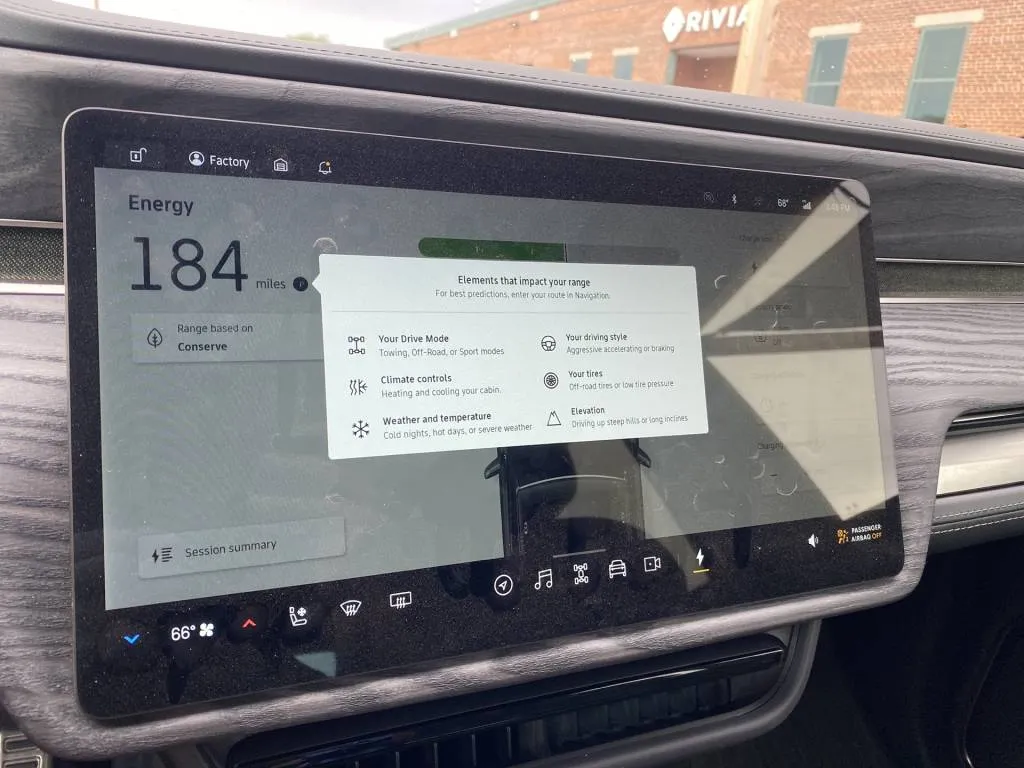
2023 Rivian R1S
Coming down to Denver: R1S efficiency and range
There were a couple of things that could use a tweak in the R1S. The wireless phone charger at the end of the armrest console doesn’t hold a consistent charge, in part due to its wide size but also due to the bounciness of an off-road-minded SUV. The instrument cluster is clean and bright, but limited in how it can be set.
I was able to get a better idea of peak efficiency of the R1S on the sunny return trip to Denver, which Google Maps clocked at 147 miles. I kept it mostly in Conserve mode with High regen to test its most efficient mode. With 91% battery left, the trip computer suggested I had 311 miles of range remaining, which is much higher than the EPA-rated max range of 274 miles. I arrived with 53% battery charge left and 184 miles remaining. That figures out to 2.87 miles per kwh. I descended about 1,800 feet total, likely helping boost the range.
The good range figure was mostly due to Conserve mode, but this is not advisable.
Rivian tells owners to limit Conserve mode to when it’s most needed. It cuts the power from the rear axle and the lowered suspension tweaks the front wheel alignment for greater stability. All the drive power moves through the front wheels and the slight bit of negative camber leads to excessive tire wire. Additionally, some Reddit users, as reported by The Drive, found the front wheels toe-in on their forward path, which chews up the front tires even more.
In a pinch, it’s good to know the various ways to optimize range, but the up-to-the-second range estimates are the real winner here.
The R1S I tested cost $99,150, including destination. Less expensive Dual-Motor models are on the way. The R1S doubles as a family hauler, camper, and off-roader, all without spewing any tailpipe emissions. You can’t do all that in any Jeep, or any other electric car. I still prefer the truck, but for a family keen on getting lost, the R1S does it all.
Correction: An earlier version of this story said the nearest Tesla Supercharger was 105 miles away in Colorado Springs. There is a Supercharger near Salida in Poncha Springs.
Electric cars news.




